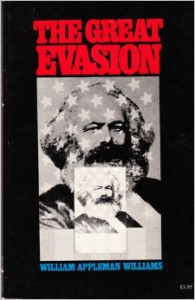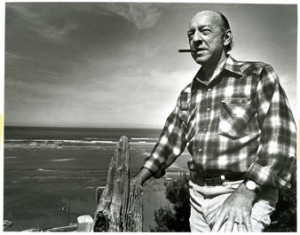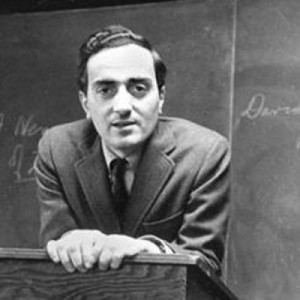 What follows is a passage of the paper that I will present at next week’s OAH as part of the panel: “Marx and Marxism in America: Totem or Taboo?” Our panel is Friday at 10:50 a.m., is sponsored by the Labor and Working-Class History Association, and participants include James Livingston, Jennifer Ratner-Rosenhagen, Claire Rydell, and Andrew Zimmerman. If you’re in St. Louis, come check it out.
What follows is a passage of the paper that I will present at next week’s OAH as part of the panel: “Marx and Marxism in America: Totem or Taboo?” Our panel is Friday at 10:50 a.m., is sponsored by the Labor and Working-Class History Association, and participants include James Livingston, Jennifer Ratner-Rosenhagen, Claire Rydell, and Andrew Zimmerman. If you’re in St. Louis, come check it out.
This passage is situated in the larger context of my analysis of Studies on the Left, a journal of radical thought founded in Madison in 1959 before moving to New York City in 1963, where it remained until its demise in 1967. My paper, which casts attention on the theoretical Marxism of Studies on the Left, is an attempt to locate Marx in the American New Left.
Efforts to put Marx to use for an American New Left could be strange. This was certainly evident in William Appleman Williams’s weird 1964 book The Great Evasion, which was wonderfully sub-titled An Essay on the Contemporary Relevance of Karl Marx and on the Wisdom of Admitting the Heretic into the Dialogue about America’s Future. “This deepening crisis of increasing alienation, deprivation, and frustration was forecast over a century ago by Karl Marx,” Williams wrote. “And of all the evasions in which Americans have indulged themselves, the most serious one is very probably their persistent flight from any intellectual and moral confrontation with Karl Marx.”
 In his effort to convince Americans to grapple with Marx, The Great Evasion reconciled Marx to the more idealist notion of American foreign policy for which Williams had gained notoriety. In this way Williams explained American imperialism in Marxist terms as an attempt to expand American economic power. But he also described such expansionism in more typically idiosyncratic terms. In explaining how the closing of the frontier had led the United States to shift its imperial gaze overseas, he wrote: “The world itself became the room required to swing the American Ego.” So whereas Williams was intent to show that American imperialism had proven Marx correct about the ineluctable expansionary forces of capital, he was also insistent on grouping Marx alongside Emerson and Thoreau as a supporter of his utopian vision of a beloved American community. As Williams wrote: “The alienation of millions of human beings—from each other, from their society, and from their own humanness—has been and remains an inherent part of the development process involved in the informal empire of the United States.” This was a humanistic, moralistic Marx that made sense to many New Leftists. But to those more attuned to the Marxist continental tradition, such a Marx was distorted beyond recognition. [1]
In his effort to convince Americans to grapple with Marx, The Great Evasion reconciled Marx to the more idealist notion of American foreign policy for which Williams had gained notoriety. In this way Williams explained American imperialism in Marxist terms as an attempt to expand American economic power. But he also described such expansionism in more typically idiosyncratic terms. In explaining how the closing of the frontier had led the United States to shift its imperial gaze overseas, he wrote: “The world itself became the room required to swing the American Ego.” So whereas Williams was intent to show that American imperialism had proven Marx correct about the ineluctable expansionary forces of capital, he was also insistent on grouping Marx alongside Emerson and Thoreau as a supporter of his utopian vision of a beloved American community. As Williams wrote: “The alienation of millions of human beings—from each other, from their society, and from their own humanness—has been and remains an inherent part of the development process involved in the informal empire of the United States.” This was a humanistic, moralistic Marx that made sense to many New Leftists. But to those more attuned to the Marxist continental tradition, such a Marx was distorted beyond recognition. [1]
 Eugene Genovese, whose staunch Old Left views had softened to the degree that he joined the Studies editorial board in 1963, nonetheless took issue with Williams’s sloppy rendition of Marx in a review of The Great Evasion that he wrote for Studies. Genovese offered Williams both criticism and praise for his weird Marxist revisionism. Genovese criticized Williams for his imprecise use of a concept like “community,” correctly highlighting the fact that plenty of non-Marxists, including fascists, supported the idea of community as a solution to alienation. Genovese argued that his emphasis on community meant that Williams ignored the most revolutionary element of Marx: class struggle. That said, Genovese appreciated Williams’s attempt to transcend the rigidness of Marx by highlighting the costs of capitalism that go beyond the immiseration of the working class. Echoing Williams, Genovese wrote: “The destruction of community solidarity alone condemns capitalism.” Williams reminded readers that Marxism was a classical call to human freedom. In this way, Genovese claimed that Williams was more Gramsci than Marx, an enormous compliment since Genovese had become the American most familiar with and most enamored by the Italian communist. In fact, thanks to Genovese, the Studies milieu looked more to Gramsci for inspiration than it did to his fellow western Marxists in the Frankfurt School. As Weinstein said of Gramsci: “we are his and he is ours.” [2]
Eugene Genovese, whose staunch Old Left views had softened to the degree that he joined the Studies editorial board in 1963, nonetheless took issue with Williams’s sloppy rendition of Marx in a review of The Great Evasion that he wrote for Studies. Genovese offered Williams both criticism and praise for his weird Marxist revisionism. Genovese criticized Williams for his imprecise use of a concept like “community,” correctly highlighting the fact that plenty of non-Marxists, including fascists, supported the idea of community as a solution to alienation. Genovese argued that his emphasis on community meant that Williams ignored the most revolutionary element of Marx: class struggle. That said, Genovese appreciated Williams’s attempt to transcend the rigidness of Marx by highlighting the costs of capitalism that go beyond the immiseration of the working class. Echoing Williams, Genovese wrote: “The destruction of community solidarity alone condemns capitalism.” Williams reminded readers that Marxism was a classical call to human freedom. In this way, Genovese claimed that Williams was more Gramsci than Marx, an enormous compliment since Genovese had become the American most familiar with and most enamored by the Italian communist. In fact, thanks to Genovese, the Studies milieu looked more to Gramsci for inspiration than it did to his fellow western Marxists in the Frankfurt School. As Weinstein said of Gramsci: “we are his and he is ours.” [2]
 Gramsci’s concept of “hegemony,” or the notion that the elite secured mastery because their ideas were accepted even by those whom they dominated, was useful as a theory for explaining corporate liberalism (the most important historical theory forwarded by the Studies milieu). In a 1967 Studies article, Genovese argued that Gramsci pointed to a more realistic reading of US history: “we need to face the fact,” Genovese wrote, “that an identification between bourgeois and general interests exists and has existed… throughout American history.” Genovese used Gramsci to make a case similar to that made by consensus historians like Hofstadter, but by replacing the concept of “consensus” with the theory of “hegemony” Genovese implied that the close identification between capitalist and worker was not what made the United States exceptional but rather what made it tragic. Consensus read Marx out of American history. Hegemony put a sophisticated Marxist spin on the stability of American corporate capitalism, which had made the American working class wealthier than anything Marx had imagined possible. [3]
Gramsci’s concept of “hegemony,” or the notion that the elite secured mastery because their ideas were accepted even by those whom they dominated, was useful as a theory for explaining corporate liberalism (the most important historical theory forwarded by the Studies milieu). In a 1967 Studies article, Genovese argued that Gramsci pointed to a more realistic reading of US history: “we need to face the fact,” Genovese wrote, “that an identification between bourgeois and general interests exists and has existed… throughout American history.” Genovese used Gramsci to make a case similar to that made by consensus historians like Hofstadter, but by replacing the concept of “consensus” with the theory of “hegemony” Genovese implied that the close identification between capitalist and worker was not what made the United States exceptional but rather what made it tragic. Consensus read Marx out of American history. Hegemony put a sophisticated Marxist spin on the stability of American corporate capitalism, which had made the American working class wealthier than anything Marx had imagined possible. [3]
Theorizing this stability was the main project of Studies and the central New Left contribution to Marxist studies. The degree to which it is still relevant is the degree to which it continues to make sense now that, in this second Gilded Age, the immiseration of the proletariat has returned like the repressed.
Notes
[1] William Appleman Williams, The Great Evasion: An Essay on the Contemporary Relevance of Karl Marx and on the Wisdom of Admitting the Heretic into the Dialogue about America’s Future (Chicago: Quadrangle Paperbacks, 1964), 18, 14, 69.
[2] Eugene D. Genovese, “William Appleman Williams on Marx and America,” Studies on the Left vol. 6, no. 1 (Jan-Feb 1966), 70-86. The Weinstein quote on Gramsci is from Tim Barker, “Wars of Position: Studies on the Left and the New American Marxism, 1959-1976” (Senior Thesis, Columbia University, 2012), which Barker found in the Christopher Lasch Papers at the University of Rochester.
[3] Eugene Genovese, “On Antonio Gramsci,” Studies on the Left Vol. VII, No. 2 (March-April 1967). This essay is found in the Weinstein-Eakins collection and the quote is from that book, 301.

6 Thoughts on this Post
S-USIH Comment Policy
We ask that those who participate in the discussions generated in the Comments section do so with the same decorum as they would in any other academic setting or context. Since the USIH bloggers write under our real names, we would prefer that our commenters also identify themselves by their real name. As our primary goal is to stimulate and engage in fruitful and productive discussion, ad hominem attacks (personal or professional), unnecessary insults, and/or mean-spiritedness have no place in the USIH Blog’s Comments section. Therefore, we reserve the right to remove any comments that contain any of the above and/or are not intended to further the discussion of the topic of the post. We welcome suggestions for corrections to any of our posts. As the official blog of the Society of US Intellectual History, we hope to foster a diverse community of scholars and readers who engage with one another in discussions of US intellectual history, broadly understood.
Andrew, this piece is great. I am interested in the way that WAW on the evasions of Marx relates to the earlier experiences of Richard T. Ely, John Commons, JB Clark, and Turner?
I am thinking of moments like the following (forgive me for drawing on my own research here, which is mostly just a cutting and pasting from Joseph Dorfman, Mary Furner, and Martin Sklar): Arthur Twining Hadley, professor of political economy at Yale, wrote a critical unsigned review of John Bates Clark’s The Philosophy of Wealth (1886) for the Independent magazine, accusing Clark of falling prey to the “crudest socialistic fallacies” and warning that popular acceptance of Clark’s work would lend credence to two doctrinal fallacies against which political economists waged daily battle: the idea that “labor creates all wealth” and that “trade is a gain of one party at the expense of another.” Letters exchanged between the two men reveals that Hadley perceived Clark’s modest deviations from orthodoxy as a grave threat. “What you say sounds so much like what Marx says on the same subject,” Hadley wrote Clark, “that readers will think that you object to speculation as such…”
Thanks for this, Kurt. I’m not sure if I can comment on the specifics of Hadley’s critique of Clark. But I will say that Genovese’s critique of Williams revolved around the ways in which Genovese thought Williams had Marx wrong. But Genovese was forgiving because he liked what Williams had to say and was thus in an unorthodox mood. In fact the New left in general, if SotL is any indication, was in an unorthodox mood. They were happy to take Marx in an eclectic number of directions–this is one of the main things that seemed to distinguish them from the Old Left.
I enjoyed this essay a lot, thanks for posting it Andrew. I want to look up the Genovese review of Williams. Your reference to Genovese as being more in line with a continental marxist tradition make me think about some of EP Thompson’s political writings from the late 1950s as he was breaking from the British Communist Party while still remaining a marxist. He criticized the moral and intellectual culture of the marxists he broke from, and in doing so voiced something that sounds to me close to Williams here. I’m curious if that’s a parallel or if they were aware of each others’ writing. Do you know if Williams or any of the other Studies on the Left people read anything from the early days of the British New Left, like The New Reasoner, early New Left Review before Anderson’s editorship, or Socialist Register?
Nate: Thanks for this. Indeed the SotL folks read the early New Left Review and in fact saw themselves as the US counterpart. The directions in which EP Thompson took Marx was apiece with those like Williams, Kolko, Weinstein, and Sklar. Definitely. In fact this makes me wonder if there is a good transatlantic or international intellectual history of the New Left. Surely some such book exists?
The last stage of the American “new left” brought Marx & Marxism to a new low. The injection of “Marxism-Leninism” into the student new left by Progressive Labor Party, RYMI & II and assorted extremist corpuscles such as the Weatherman faction of SDS, spelled the death of the protest movement & creative interpretations of Marx & Marxism. In one decade, the academics raised Marx from the dust-bin and the “comrades” returned him to the dust-bin, in the American imagination.
Lawrence, yes I agree with that interpretation to a degree, although I would argue the late New Left activist use of Marx was short-lived, whereas the early New Left intellectual use of Marx had legs since many of these individuals ended up in academic writing influential books.